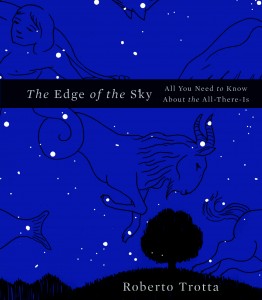By Roberto Trotta
Would you try to cross the South Pole wearing only flip-flops? Or row across the Atlantic on an inflatable swimming pool? Or describe the beauty and mystery of the universe using only the most common 1,000 words in English?
In my book “The Edge of the Sky — All you need to know about the All-There-Is” I try to achieve something seemingly impossible with the simplest of means: to rethink our understanding of the universe using only a handful of different words (707, to be precise). My aim was to discuss some of the biggest questions in science today, in a language that is accessible to everybody.
The first challenge I faced was to talk about the universe… without using the word ‘universe’, for this was not on the list of the 1,000 words. I was shocked to discover that many of the words I would have liked to use were not available to me. For example, I couldn’t use ‘galaxy’, ‘particle’, ‘planet’, ‘earth’, or ‘scientist’. It seemed hopeless!
But as I persevered, something unexpected happened.
A childlike perspective of the cosmos
A new voice started to emerge from the format itself. So ‘galaxies’ became ‘Star-Crowds’; ‘particles smashing together’ became ‘drops kissing each other’; ‘planets’ were ‘crazy-stars’; the ‘Milky Way’ became the ‘White Road’, ‘scientists’ became ‘Student-People’. The extremely limited lexicon I was working with created a poetic straitjacket that gave me a new, childlike perspective on the cosmos.
Armed with this simple yet powerful language, I found I could tackle all the subjects I wanted, from the Big Bang to the possibility of parallel universes.
To some, reducing the vast and rich English lexicon to a mere 1,000 words is plain wrong, tantamount to a butchery of the English language. Others have seen in my experiment a radical approach to science communication: jargon-free and full of metaphors and imagery. By getting rid of all but the simplest of words, the story of the universe acquires the immediacy of folk tales, or perhaps of a post-apocalyptic future when the ‘proper’ words for complex scientific ideas have been lost.
An excerpt from the book follows below:
It seems crazy that student-people should think that there is a lot more stuff that you can not see than stuff that you can see. Still, they do. In fact, they believe that there is about five times more Dark Matter than normal matter.
If you look around us with a Far-Seer, you will realize that the White Road is made of many, many stars. There are about three times twenty stars in the White Road for each person on our Home-World.
And if you use a Big-Seer, you will find that there are as many other Star-Crowds in the sky as there are stars in the White Road.
And yet all of this is just a tiny bit of everything there is.
The universe speaks to us through the language of mathematics
This is not to say that science is simply a fictional narrative among many others. The unique power of science rests on its ability to observe, infer and quantify regularities about the world we live in, that is, the ‘laws of nature’.
But translating the contents of mathematical expressions into natural language raises the question of whether any choice of words is sufficiently accurate for the purpose. Is ‘electron’ any better than ‘Very Small Drop’ to describe what a physicist understands by that term, and all the complex quantum-mechanical ideas associated with it?
Despite its richness and many shades of subtlety, the English language cannot replace the full depth of understanding allowed for by mathematics — no natural language could. For all natural languages cannot be but an approximation of the true, exact and mysteriously powerful language of nature: mathematics. In the end, natural language descriptions of the fundamental nature of the universe and of its governing laws are bound to be inadequate.
My translation of complex cosmological ideas into very simple English tries to subvert the inadequacy of natural language, when compared with mathematics, by reducing it to the smallest number of atoms. Just like the periodic table of the elements can explain the entirety of the chemistry we see around us, so I imagined that the most common 1,000 words could provide the building blocks for a new description of the complexities of the universe.
Whether or not I have succeeded in my goal is a question that only my readers can answer. If my book can inspire some of them and generate a new spark of wonder for the cosmos we live in, I’ll be happy.
—–
* ScWRL editors: A major focus of good science communication is to simplify language and minimize jargon (see here and here). Roberto’s fascinating concept bears strong parallels with this aim, but we wouldn’t recommend students try to limit themselves to the words that fall under the Edge Of The Sky umbrella, especially when writing for academic audiences.
—–
If you are intrigued by the Edge Of The Sky concept, give it a whirl by using the following web-based tool: www.upgoer5.info.
** This is an edited version of a VOICES blog post accompanying Roberto’s British Council English Lecture in November 2014.
About Roberto Trotta
Roberto Trotta is an astrophysicist at Imperial College London, where he studies dark matter, dark energy and the Big Bang, and an STFC Public Engagement Fellow. He is also the Director of Imperial’s Centre for Languages, Culture and Communication
Roberto was named as one of the 100 Global Thinkers 2014 by Foreign Policy, for “junking astronomy jargon”.
@R_Trotta


